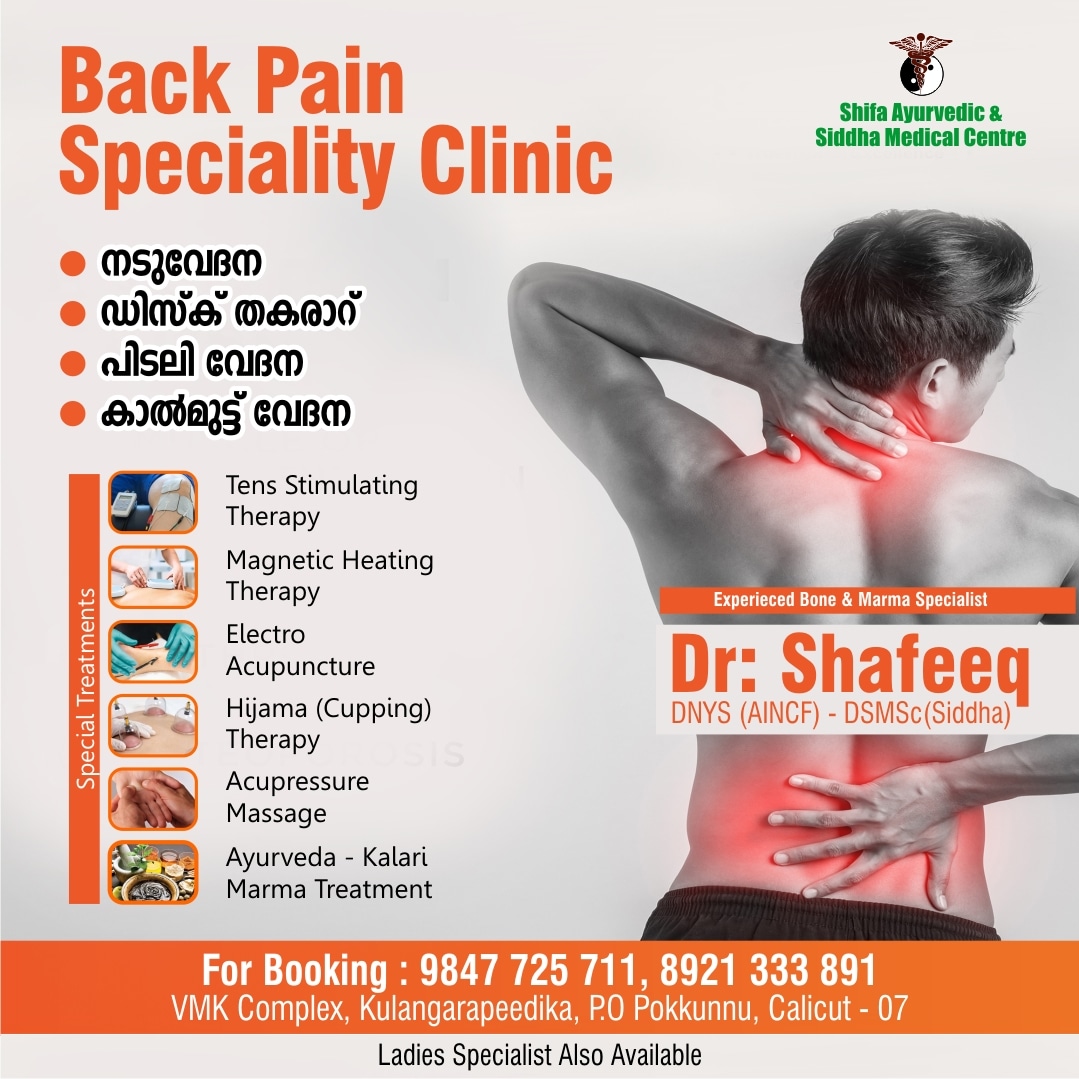Shifa Ayurvedic And Siddha Medical Centre
Kulangara Peedika - Kozhikode
Products & Services:
Shifa Ayurvedic And Siddha Medical Centre, Kulangara Peedika, Kozhikode, Reviews, Contact number, Ph More..
Since : 2004
Kulangara Peedika - Kozhikode
Products & Services:
Shifa Ayurvedic And Siddha Medical Centre, Kulangara Peedika, Kozhikode, Reviews, Contact number, Ph More..
Since : 2004
Migraine Special Treatment encompasses advanced and targeted approaches designed to provide relief for individuals suffering from migraines. These treatments are tailored to address the unique triggers and symptoms associated with migraines, offering customized solutions that go beyond conventional methods. In Kozhikode, several clinics and specialists provide dedicated migraine care, utilizing a range of therapies to help patients manage and alleviate their migraine symptoms effectively.
Migraine Special Treatment refers to a range of specialized therapeutic approaches aimed at alleviating the symptoms of migraines and preventing their recurrence. Unlike general headache treatments, migraine special treatments focus specifically on the complex nature of migraines, which can involve various factors such as hormonal changes, neurological triggers, and lifestyle influences.
Shifa Ayurvedic And Siddha Medical Centre
Ayushakti Migraine Clinic
Kozhikode Neurology and Pain Clinic
Sree Sankara Ayurveda & Migraine Treatment Centre
Dr. Biju's Migraine Management Centre
Life Care Migraine Therapy Centre
Healing Touch Migraine Clinic
NLP Migraine Clinic
Dr. Rajeev's Migraine and Pain Management Centre
Kozhikode Headache and Migraine Treatment Centre
Migraines are a serious neurological condition that affects millions of people globally, causing severe headaches, nausea, and sensitivity to light and sound. These symptoms can make daily activities challenging. While home remedies and over-the-counter medications may provide temporary relief, chronic migraines often require specialized medical care.
Migraine doctors are experts in diagnosing and treating different types of headaches, particularly migraines. They understand the triggers, symptoms, and underlying causes of migraines, offering accurate diagnoses and personalized treatment plans. These specialists focus not only on pain relief but also on educating patients and providing long-term care and support.
In India, migraines are common, yet many people are unaware of the specialized care available. By consulting a migraine specialist, patients can benefit from advanced treatments and therapies tailored to their unique needs. This professional approach helps alleviate migraine symptoms and improves the overall quality of life for those affected.
When dealing with migraines, different types of healthcare professionals specialize in diagnosing and treating this condition. Here are the key types of migraine doctors:
Neurologists
Neurologists specialize in the nervous system, making them the primary choice for diagnosing and treating migraines. They have expertise in identifying triggers, assessing symptoms, and creating treatment plans tailored to each patient.
Headache Specialists
These are neurologists who have received additional training in headaches and migraines. They focus specifically on managing chronic and complex cases, offering advanced treatments and therapies.
Pain Management Specialists
Pain management doctors focus on treating chronic pain, including migraines. They often provide specialized treatments like nerve blocks, injections, and alternative therapies to reduce migraine pain.
Primary Care Physicians
General practitioners or family doctors can help diagnose migraines and prescribe basic treatments. They are usually the first step in migraine care, especially for mild or infrequent cases.
Otolaryngologists (ENT Doctors)
Some migraines are related to sinus issues or inner ear problems, making ENT doctors relevant for diagnosing migraines linked to these conditions.
Psychiatrists
Since migraines can sometimes be triggered or worsened by stress, anxiety, or depression, psychiatrists play a role in managing the mental health aspects of migraine treatment.
Accurate Diagnosis
A migraine doctor can provide a precise diagnosis, distinguishing migraines from other types of headaches and identifying specific triggers.
Personalized Treatment Plans
Migraine specialists create tailored treatment strategies based on individual symptoms, triggers, and medical history, ensuring more effective care.
Access to Advanced Treatments
Consulting a migraine doctor gives patients access to the latest therapies and medications, including preventive treatments and alternative options like Botox injections or nerve blocks.
Better Symptom Management
With expert guidance, patients can manage debilitating symptoms like nausea, sensitivity to light, and throbbing pain more effectively, improving their overall quality of life.
Preventive Care
Migraine doctors help develop long-term preventive plans to reduce the frequency and intensity of migraines, minimizing the impact on daily life.
Holistic Approach
Migraine specialists often consider the overall health of the patient, addressing mental, emotional, and physical factors to provide comprehensive care.
Ongoing Support
Regular consultations with a migraine doctor ensure continuous monitoring and adjustments to treatment, helping patients stay on top of their condition.
Preventing Migraines
Identify and Avoid Triggers
Common migraine triggers include stress, certain foods (like caffeine, chocolate, and aged cheese), lack of sleep, and bright lights. Keeping a migraine diary can help you identify specific triggers and avoid them.
Maintain a Healthy Lifestyle
Regular exercise, a balanced diet, and staying hydrated can reduce the frequency of migraines. A consistent sleep schedule also helps in preventing attacks.
Manage Stress
Stress is a major trigger for migraines. Practice relaxation techniques such as yoga, meditation, or deep-breathing exercises to help manage stress effectively.
Take Preventive Medications
For chronic migraine sufferers, doctors may prescribe preventive medications like beta-blockers, antidepressants, or anticonvulsants to reduce the frequency of attacks.
Regular Physical Activity
Engaging in moderate exercise such as walking or swimming can improve overall health and reduce the chances of migraines. However, avoid strenuous activity that may trigger an attack.
Stay Consistent with Meals
Skipping meals or fasting can trigger migraines. Eating regular, balanced meals helps maintain blood sugar levels and prevents sudden headaches.
Limit Caffeine and Alcohol
Excessive consumption of caffeine and alcohol can lead to migraines. Moderating or avoiding these substances can help in migraine prevention.
Consider Alternative Therapies
Acupuncture, biofeedback, and cognitive behavioral therapy (CBT) are alternative therapies that have been shown to help prevent migraines for some individuals.
Varicose veins are swollen, twisted, and bulging veins that appear blue or dark purple, usually just beneath the skin's surface. They are often caused by obstructed blood flow or improper blood circulation. These veins are commonly seen in the legs, feet, and ankles. If left untreated, varicose veins can lead to pain, irritation, bleeding, ulcers, and skin discoloration. Doctors who treat varicose veins specialize in diagnosing and treating this condition using advanced procedures such as radiofrequency ablation, ligation and stripping, sclerotherapy, and endovenous laser treatment.
Specialists in varicose vein treatment offer several advanced procedures to address the condition effectively. Common treatment methods include:
Varicose veins can cause discomfort and pain, making it crucial to seek treatment from a qualified medical professional. When looking for doctors for varicose vein treatment, it's important to assess your options carefully. Consider the following factors to make an informed decision:
Specialization and Experience: Choose doctors with a focus on vascular medicine and extensive experience in treating varicose veins. Specialists in this field are more likely to provide accurate diagnoses and effective treatments.
Board Certification: Ensure the doctor is board-certified in a relevant field, such as vascular surgery or phlebology. Certification indicates that the doctor has met high standards of training and expertise in varicose vein treatment.
Treatment Options: Ask about the range of treatments available, including minimally invasive options like endovenous laser therapy or radiofrequency ablation, and more traditional surgical methods. A personalized treatment plan based on your condition is essential.
Technology and Equipment: Evaluate the use of advanced technology and modern tools in the clinic. Cutting-edge equipment improves the precision and comfort of varicose vein treatments.
Reviews and Testimonials: Read patient reviews to get insights into the doctor’s reputation, communication skills, and overall patient care. Positive experiences from others can help you gauge the doctor’s expertise and bedside manner.
Insurance Coverage: Confirm that the doctor accepts your health insurance plan. Understanding coverage and potential out-of-pocket costs is important to avoid unexpected expenses during treatment.
1. What are varicose veins?
Varicose veins are swollen, twisted veins that often appear blue or dark purple and are visible just beneath the skin's surface. They commonly occur in the legs and feet due to weakened valves that lead to poor blood circulation.
2. What causes varicose veins?
Varicose veins are primarily caused by weakened vein valves and walls that lead to blood pooling and vein enlargement. Factors contributing to varicose veins include genetics, aging, prolonged standing, obesity, and pregnancy.
3. What are the symptoms of varicose veins?
Common symptoms include visible, bulging veins, aching or heavy legs, pain after standing or sitting for long periods, itching or burning around the veins, and sometimes swelling or skin discoloration.
4. How are varicose veins diagnosed?
A diagnosis is typically made through a physical examination and medical history review. Doctors may use ultrasound imaging to assess the blood flow in the veins and determine the extent of the problem.
5. What is a migraine?
A migraine is a severe headache often accompanied by symptoms such as nausea, vomiting, sensitivity to light and sound, and visual disturbances. Migraines are typically recurrent and can last from a few hours to several days.
6. What are the common triggers for migraines?
Common migraine triggers include stress, certain foods and drinks (like alcohol, caffeine, and aged cheeses), hormonal changes, lack of sleep, dehydration, bright lights, strong odors, and changes in weather.
7. How are migraines diagnosed?
Diagnosis is usually based on a detailed medical history and description of symptoms. A healthcare provider may also perform a physical and neurological examination. In some cases, imaging tests like MRI or CT scans may be used to rule out other conditions.

Kozhikode, Kulangara Peedika

Kozhikode, Kulangara Peedika